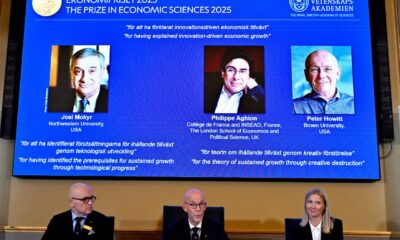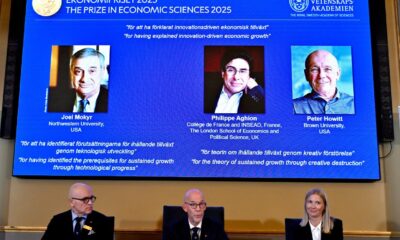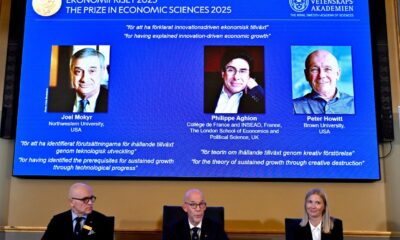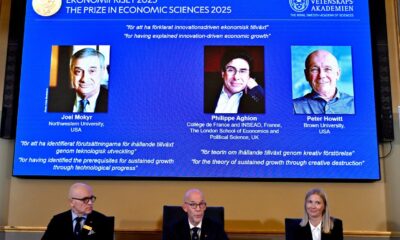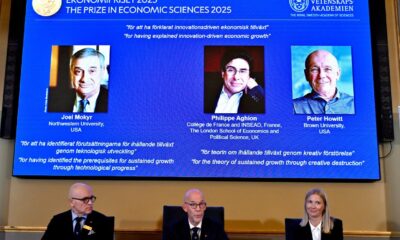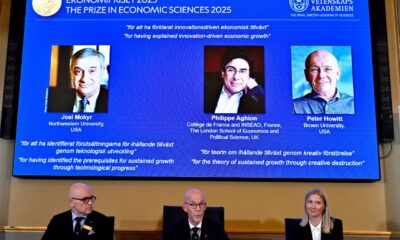Science
Researchers Win Nobel Prize for Insights on Economic Innovation
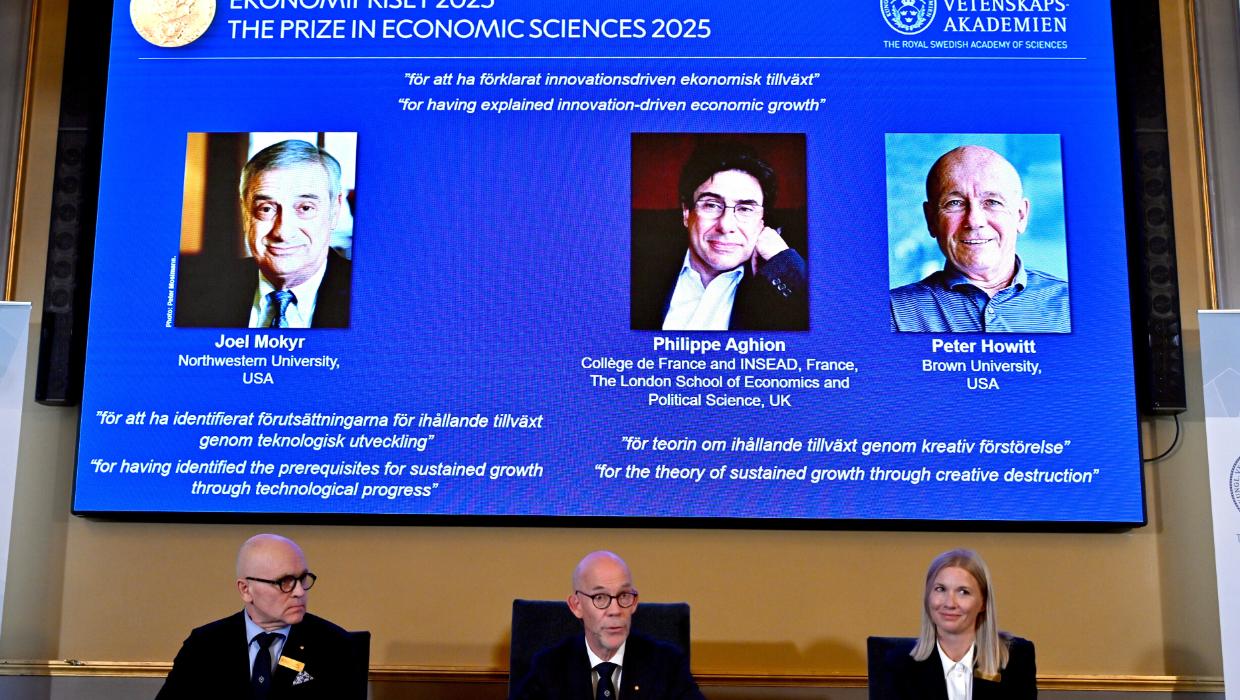
Three prominent economists were awarded the Nobel Memorial Prize in Economic Sciences on October 9, 2023, for their groundbreaking work on the concept of “creative destruction” and its role in economic growth. Dutch-born Joel Mokyr, 79, from Northwestern University; Philippe Aghion, 69, affiliated with both the Collège de France and the London School of Economics; and Canadian-born Peter Howitt, 79, from Brown University, were recognized for their contributions to understanding how innovation disrupts established businesses and fosters human welfare.
Their research sheds light on how new inventions and ideas can propel economic advancement, often at the expense of older companies. This dynamic, which has historical roots dating back to the advent of steam locomotives, remains relevant today as e-commerce transforms the retail landscape and digital platforms challenge traditional business models.
Unpacking Creative Destruction
The laureates were specifically commended for clarifying and quantifying the process of creative destruction, a term popularized by economist Joseph Schumpeter in his 1942 work, “Capitalism, Socialism and Democracy.” The Nobel committee highlighted Mokyr’s assertion that understanding the success of innovations requires scientific explanations, not just practical outcomes.
Aghion and Howitt’s contributions include a complex mathematical model introduced in 1992, which expanded on earlier theories by incorporating new variables affecting sustained economic growth. Their findings illustrate how industries with limited competition can stifle innovation, raising concerns in sectors such as telecommunications and social media.
The Nobel committee emphasized that the work of these economists underscores the necessity of maintaining mechanisms that encourage creative destruction to avoid economic stagnation. John Hassler, chair of the committee, noted, “Economic growth cannot be taken for granted.”
The Human Impact of Innovation
Aghion and Howitt advocated for policies that support workers affected by technological changes, focusing on aiding mobility toward more productive roles rather than preserving specific jobs. They also stressed the importance of social mobility, asserting that an individual’s career should not be constrained by their family’s background.
Mokyr has consistently taken an optimistic view of technological progress, countering the notion that recent innovations, such as smartphones and the internet, have had minimal economic impact compared to earlier breakthroughs like the airplane or car. He argued that many contemporary services, although inexpensive or free, provide significant benefits that are often underreported in economic data.
In a 2015 interview with The Associated Press, Mokyr cited the music streaming service Spotify as an example of an innovation that offered immense value, despite challenges in quantifying its economic contribution. He acknowledged that while new technologies may lead to short-term job losses, they also create unexpected opportunities for employment.
The Nobel committee pointed out that for much of history, human economies experienced stagnation rather than growth. It was only with the Industrial Revolution in the 18th century that significant economic expansion began to take shape.
As Europe grapples with a productivity gap in digital technologies compared to the United States, Aghion emphasized the urgency of fostering innovation through research and venture capital. “We have to wake up,” he stated, warning that the competition for leadership in innovation will favor those who adapt and innovate effectively.
Mokyr and Aghion also discussed the implications of artificial intelligence (AI) on future economic growth. Aghion expressed optimism about AI’s potential but cautioned that its benefits hinge on the right institutional frameworks to encourage competition. Mokyr dismissed fears that AI would lead to mass unemployment, describing it instead as a valuable research assistant that could elevate the nature of work.
A Celebration of Achievement
Both Mokyr and Howitt recounted the surprise of learning about their Nobel win. Mokyr shared that he was initially puzzled by congratulatory messages received early in the morning, while Howitt thought a reporter’s call might be a prank. Aghion noted that the Nobel committee had to reach out for his co-recipients’ contact information, reinforcing the collaborative spirit of their achievement.
The Nobel Prize, valued at 11 million Swedish kronor (approximately $2.02 million), is divided between Mokyr and Aghion and Howitt, who share the remainder. Winners also receive an 18-carat gold medal and a diploma, awarded annually on December 10, the anniversary of Alfred Nobel’s death.
As the world continues to navigate the complexities of economic innovation, the insights of these three economists will play a critical role in shaping policies that foster a dynamic and inclusive economic landscape.
-

 World6 days ago
World6 days agoPrivate Funeral Held for Dean Field and His Three Children
-

 Top Stories1 week ago
Top Stories1 week agoFuneral Planned for Field Siblings After Tragic House Fire
-

 Sports3 months ago
Sports3 months agoNetball New Zealand Stands Down Dame Noeline Taurua for Series
-

 Entertainment3 months ago
Entertainment3 months agoTributes Pour In for Lachlan Rofe, Reality Star, Dead at 47
-

 Entertainment2 months ago
Entertainment2 months agoNew ‘Maverick’ Chaser Joins Beat the Chasers Season Finale
-

 Sports3 months ago
Sports3 months agoSilver Ferns Legend Laura Langman Criticizes Team’s Attitude
-

 Sports4 weeks ago
Sports4 weeks agoEli Katoa Rushed to Hospital After Sideline Incident During Match
-

 Politics2 months ago
Politics2 months agoNetball NZ Calls for Respect Amid Dame Taurua’s Standoff
-

 World2 weeks ago
World2 weeks agoInvestigation Underway in Tragic Sanson House Fire Involving Family
-

 Entertainment3 months ago
Entertainment3 months agoKhloe Kardashian Embraces Innovative Stem Cell Therapy in Mexico
-

 Sports4 weeks ago
Sports4 weeks agoJamie Melham Triumphs Over Husband Ben in Melbourne Cup Victory
-

 World4 months ago
World4 months agoPolice Arrest Multiple Individuals During Funeral for Zain Taikato-Fox

